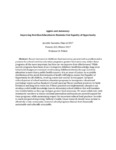Apples and Autonomy: Improving Nutrition Education to Maximize Fair Equality of Opportunity

View/
Author
Saccente, Jennifer Elizabeth
Subject
Washington and Lee University -- Capstone in Shepherd Program for the Interdisciplinary Study of Poverty and Human Capability
Nutrition
Diet
Health education (Elementary)
Bandura, Albert, 1925-
Metadata
Show full item recordDescription
Jennifer Elizabeth Saccente is a member of the Class of 2017 of Washington and Lee University. Capstone; [FULL-TEXT FREELY AVAILABLE ONLINE] Recent increases in children's food autonomy present both a problem and a promise for school nutrition education programs: greater food autonomy makes these programs all the more important, but how can we improve their effectiveness? While current programs have been shown to improve children's health knowledge, long-term behavioral changes are minimal. Ameliorating childhood obesity through nutrition education is more than a public health concern, it is an issue of justice: an equitable distribution of the social determinants of health will help to ensure Fair Equality of Opportunity for all children, creating a more just society. In this paper, I propose redevelopment of school nutrition education programs to incorporate educational psychology tenets such as Bandura's Social Learning Theory and best practices for habit formation and long-term retention. If these practices are implemented, educators can develop a solid health knowledge base in elementary school children that will translate into healthy habits as they age and gain greater food autonomy. We must collaborate with community members to ensure minimal paternalism and maximum parental support for these programs, while maintaining respect for important cultural food practices. In order to reach our goal of improving children's health, future research should focus on how to effectively create community-centered school programs that are both financially sustainable and culturally acceptable. Jennifer Saccente